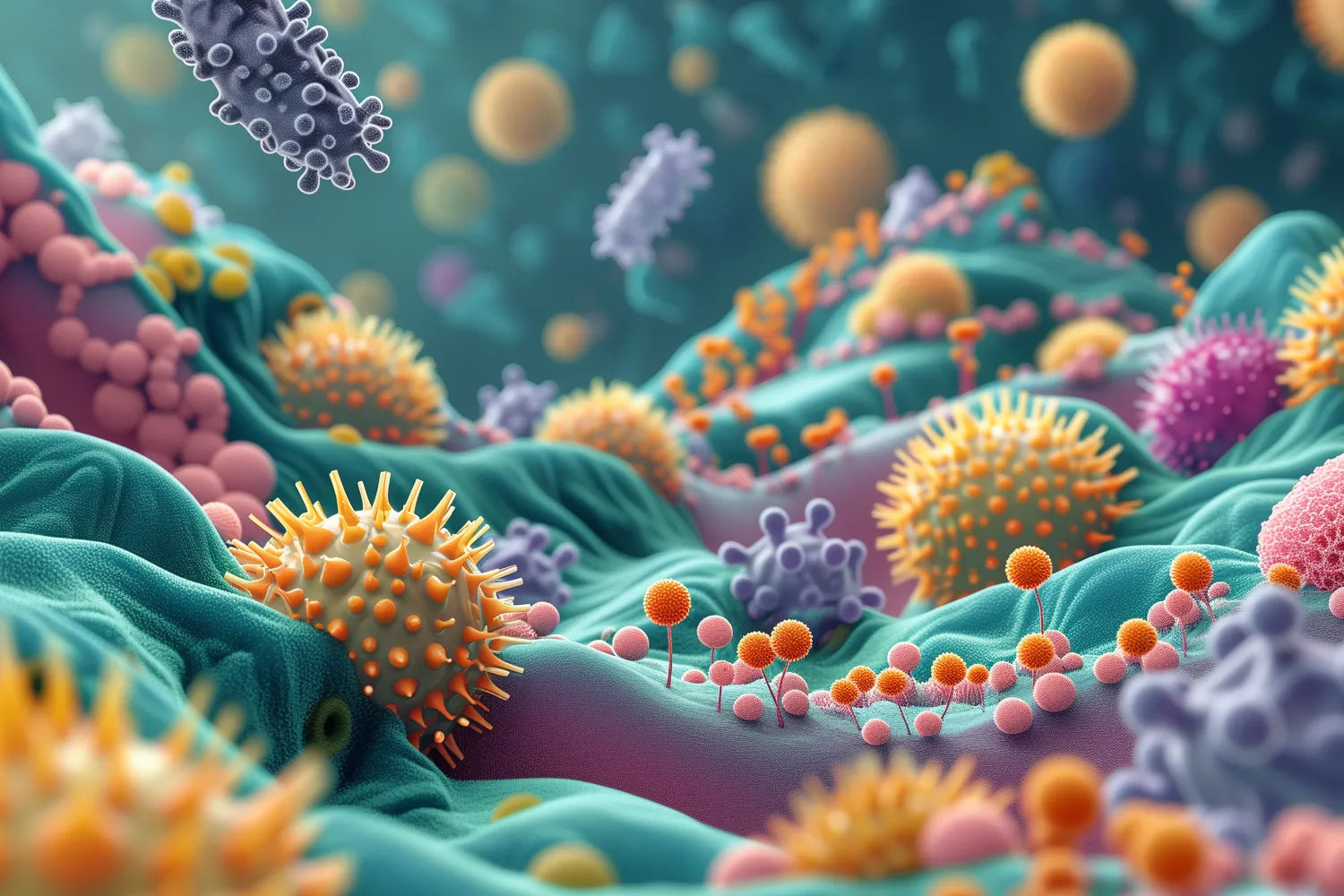
Dr. Eric Venn-Watson’s Highlights
It seems fish oil supplements are at the height of popularity; practically everyone you know seems to be taking one…and suffering through several hours of fishy aftertaste after each capsule they take.
Fish oil’s claim to fame has always centered around heart health, but it has purported skin and other benefits, too.
Together, we’ll explore how fish oil was discovered, how we get it, what it can do in terms of keeping your skin looking youthful and healthy, and why the new essential fatty acid on the block might be a good addition to the essential fatty acid health stack.
What Is Fish Oil?
Fish oil, such as cod liver oil, is an extraction from fatty fish that contains omega-6s and omega-3 fatty acids. Two types of omega-3 fatty acids that can be found in fish oil include EPA (eicosapentaenoic acid) and DHA (docosahexaenoic acid). EPA and DHA are both polyunsaturated fatty acids.
Omega-3s include many molecules, including ALA, EPA, DHA,EPA, and DHA, which are found in most food sources.
ALA is an essential fatty acid. For nutrients to be essential to our bodies, it means we need them to function properly but can’t make them on our own. As such, we have to get them from food and/or supplementation.
Dietary sources of omega-3 are fatty fish like salmon, tuna, mackerel, and trout. You can also find omega-3 in some shellfish, like mussels and crabs. These all contain EPA and DHA as well as omega-6 fatty acids. Nuts, seeds, and vegetable oils contain ALA (alpha-linolenic acid), an omega-3 that the body can convert to EPA and DHA, although that conversion process isn’t extremely efficient.
What’s in a Fish Oil Supplement?
If your diet doesn’t contain a lot of fatty fish, a supplement is usually recommended. Fish oil supplements are made up of oils that are extracted from either the livers and/or tissues of fatty fish.
Most fish oil supplements will contain a blend of both tissue and liver oils, from numerous different fish. You’ll probably also find some preservative ingredients tossed in the capsule.
Because fish oil supplements are derived from fish, they frequently have a fishy aftertaste, even if they claim to be a “burpless” formula.
Fish oil supplements contain ALA, DHA, EPA, and often, a lot of less desirable ingredients, toxins, and fillers.
How Was Omega-3 Discovered?
It’s important to talk a little bit about the discovery of omega-3, because it directly relates to skin health.
Omega-3s were discovered in 1929 by Mildred and George Burr, a husband and wife team, by removing omega-3 fatty acids from the diet of mice. They found that the mice developed poor skin and hair.
Further studies led to the realization that omega-3 was essential for human growth and development. Since that time we have learned more about how omega-3 works in the body and how it can potentially benefit human skin.
Fast forward 90 years, and another husband and wife doctor/scientist team discovered a new essential fatty acid called C15:0 that has more health benefits and is safer for our cells than omega-3s. More on that soon!
Fish Oil for Skin Health
Most of us would admit we’d love to have healthier, more youthful-looking skin. Unfortunately, many of the skin-care treatments we find on store shelves only treat the top layer of the epidermis, which houses a layer of already dead skin cells.
Taking a fish oil supplement might be able to help you get healthier skin. Here’s what we know.
How The Skin Works
First, it will be beneficial to understand a little about how the skin works and why some of the treatments you’ve been using might not be doing what you want them to do.
The skin is made up of layers and is in a process of continual renewal. The outermost layer is the epidermis, or skin barrier. The skin barrier function protects the other layers of skin against moisture loss and pathogens.
New skin cells are made in the deepest layers of skin tissue. As new cells form, they are pushed up through the layers of skin to the epidermis, where they will eventually die. Eventually, those dead skin cells are sloughed away through natural processes or through exfoliation.
Collagen and Elastin
There are two important proteins that make up your skin. One is collagen. Collagen is important in that it gives your skin its structure. It’s what fills out our cheeks and keeps our skin looking youthful and plump. Elastin is what gives skin its ability to stretch and snap back into place.
Both collagen and elastin production begins to decline with age. We lose collagen at a rate of one percent per year after age 20. When we lose collagen and elastin, we begin to notice the visible signs of skin aging, like fine lines, wrinkles, and sagging skin.
Free Radicals and Your Skin
Another problem with aging skin is free radical damage. Free radicals are unbalanced molecules that can damage healthy cells. Your body creates free radicals in response to external stressors like UV rays, cigarette smoke, and pollution. Free radical damage might look like sun damage, uneven skin tone, or the appearance of creases and wrinkles.
Your skin needs antioxidants to protect them against free radical damage and help reduce the damage already done.
Skin Cell Turnover
We discussed how the skin is continually renewing, but with age, your skin cell turnover slows down. That means you aren’t making new skin as quickly, which can lead to skin that looks dull, dehydrated, and uneven.
Now that we know what’s happening to our skin, let’s examine some of the skin concerns that using fish oil could help you with.
Dry Skin and Eczema
Suffering from chronic dry skin and eczema can be frustrating. It can feel like no matter how much heavy moisturizing cream you use, you can never get relief.
Eczema can be caused by numerous factors, including changes in the weather. If you typically get patches of eczema in the winter, it could be because the air is colder and drier during winter months. Combined with commercial heaters inside stores and office buildings, winter can be brutal on the skin.
Eczema can also be caused by an inflammatory immune response to stress. Developing patches of irritation during stressful periods in your life may be a sign your immune system is a little off-balance.
Symptoms of eczema include:
- Dry, flaky patches of skin, commonly on the face, joints, legs, hands, and arms
- Itchy, scaly areas of skin
- Redness, irritation that doesn’t seem to go away
Fish oil may be able to help. Because fish oil contains DHA and EPA, which are thought to inhibit inflammation, it may be useful in calming eczema.
Another important part of treating eczema is focusing on skin hydration. No matter what kind of supplement you’re using, your skin won’t stand a chance to stay hydrated if you aren’t drinking enough water to support skin hydration. When the skin is properly hydrated, the skin barrier function can help protect it from water loss.
Acne
At some point, virtually everyone struggles with a breakout (or two, or three). Acne is one of the most common skin conditions you can develop, and it can be difficult to get rid of a serious case of cystic acne without medical intervention.
Acne has numerous causes.
- Heredity. One possible cause of acne is in your genes. If one or both of your parents had acne, you will be more likely to develop acne.
- Improper skin care. Not using the correct products on your skin, or not washing your face regularly can lead to clogged pores that result in acne bumps.
- Hormones. Hormonal changes can trigger your sebaceous glands to produce additional sebum. Sebum mixes with dirt and dead skin cells on your skin and clogs pores to form blemishes.
Fish oil’s effects on acne have been studied with varying results. While some studies show fish oil to be beneficial in decreasing the amount and frequency of acne breakouts, there are also studies that show taking a fish oil capsule either had no effect on the subject’s acne, or that it potentially exacerbated it.
Even though an intake of omega-3 is sometimes linked with anti-inflammatory properties, an omega-3 fish oil supplement is not likely to help with the inflammation you get as a result of cystic acne.
Sunspots and Discoloration
Getting older usually means the development of “liver spots,” or sunspots. These spots form from years of UV exposure. Growing up in the 80’s and 90’s meant you likely didn’t wear sunscreen, or at least not a lot of it. As adults, we’re definitely paying for those golden tans we used to get each year.
We talked aboutultraviolet radiation damage when we discussed free radical damage. Those free radicals attack your cells and damage them, resulting in skin spots that can become permanent. Eventually, the damage can lead to sunburns, dark spots of hyperpigmentation, and even skin cancer.
While it isn’t likely fish oil will help you eradicate those sunspots overnight (or even over a longer period of time), it can help diminish their appearance. Fish oil also is thought to help with wound healing and can inhibit melanin production, which may help reduce the risk of developing UV-related sunspots.
It’s important to note, however, that increased melanin is a built-in safeguard for your skin, allowing it to get darker before you burn. While taking omega-3 supplements, it’s important to make sure you are using proper sunscreen.
Psoriasis
This skin condition is similar to eczema in that it can cause red, flaky patches of skin, but psoriasis is a disease with no cure. It can be managed with topical skin treatments and by avoiding certain triggers, like extreme stress or certain production ingredients.
Because the benefits of omega-3 include the ability to soothe irritation, some people with psoriasis might find that fish oil helps, even if just a little. In one meta-analysis, the effects of omega-3s on psoriasis were positive, helping people experience fewer symptoms.
The Bottom Line: Does Fish Oil Really Work for Skin Health?
Fish oil may be beneficial to your body, but it may not be a miracle capsule that will give you glowing skin overnight. The side effects of taking fish oil, like fishy aftertaste, loose stools, and potential heartburn often disqualify it from being the skincare supplement of anyone’s dreams.
In fact, let’s look a little closer at the fish oil supplement you’re currently taking.
Fish Oil Facts
Recently, an independent research group decided to test samples of fish oil supplements they found on store shelves. What did they find? One out of 10 bottles of fish oil capsules actually contained rancid product.
Because fish oil contains omega-3, a polyunsaturated fatty acid (PUFAs), it’s subject to oxidation. When the ingredients oxidize, the oil becomes rancid, just like cooking oil that has been sitting in the pantry for too long.
The health benefits of fish oil aren’t quite as notable when the fish oil has spoiled. In fact, it would be better to avoid using it.
That’s not the only downside. Taken in higher doses, fish oil can lead to blood thinning, increased bleeding if an injury were to occur, and unhealthy low blood pressure. For all its benefits, these drawbacks are worth considering, especially if you currently have other health conditions.
For your skin, there are better solutions and even a better fatty acid.
When you want healthy skin, it often helps to start at the cellular level. Skin cells need nourishment and support to produce collagen, elastin, and keep skin looking and feeling youthful.
Healthier Skin, Better Fatty Acid
Healthy skin is a process, but the process starts in your cells. As we get older, our skin cells regenerate more slowly, leaving our skin looking older, feeling drier, and making fine lines and wrinkles crop up around the corners of our eyes.
Inside your skin’s cells, two structures begin to fail:
- Cell membranes. As our skin cells get older, the cell membranes that protect them and give them structure begin to wear out, becoming flimsy and allowing your skin to be more easily harmed by external stressors.
- Mitochondria. The mitochondria of your skin cells give them their energy, so they can create new skin cells, produce collagen and elastin, and keep your skin looking youthful. As you get older, mitochondrial function begins to wane.
It’s not just happening in your skin, either — it’s happening all over your body. All your cells are experiencing the same decline with age. While fish oil may be helpful, science supports that another essential fatty acid may be more beneficial to your cellular health.
Elevate your cells. Elevate your self.
Buy NowPentadecanoic Acid and Your Skin
Meet pentadecanoic acid, also known as C15:0. This odd-chain, essential, saturated fatty acid was also discovered by helping dolphins live healthier and longer lives. Scientists noted that dolphins who ate a diet of fish that contained higher levels of C15:0 lived longer and had fewer age-related diseases than other populations of dolphins. Since publishing their results in Nature’s Scientific Reports in 2020, over 80 peer reviewed publications have been published by teams all over the world describing the benefits of C15:0 to our health. These publications also support that C15:0 is the first essential fatty acid to be discovered since omega-3 over 90 years ago.
How C15:0 Works
C15:0 works by strengthening cell membranes, increasing mitochondrial function, and activating receptors that regulate many parts of our everyday health.*
Studies also showed that cellular stability increased by 80%, and mitochondrial function increased by 45% when C15:0 was taken regularly.*
In addition, numerous peer-reviewed studies have proven that C15:0 actually reverses aging activities inside your cells.* C15:0 generates more ATP creation in the cells.* ATP is cellular energy currency, the driving force behind all cellular activity. C15:0 also helps repair broken energy pathways in the cells, helping them restore functionality.*
Looking for more balance? Homeostatic functions in your body keep your body balanced and regulated. When they’re unregulated, we experience disease and dysfunction. C15:0 helps regulate these functions by activating AMPK and helping restore equilibrium.*
How do I get more C15:0 in my diet you may ask? That’s where fatty15 comes in.
Fatty15 and Your Skin
You can get the great skin-healthy benefits of C15:0 by taking the first and only supplement to contain the pure, vegan-friendly, plant derived, version of this healthy, essential fatty acid, FA15™.* In fact, 2 out of 3 people taking fatty15 report near-term benefits, such as thicker hair and more healthy skin in six weeks.*
Fatty15 is a vegan-friendly, easy-to-swallow, small capsule with no fishy aftertaste and no fishy ingredients. Just 100 mg per day can give you healthier skin.**
What Else Can You Do To Have Better Skin?
It’s pretty simple. When we take care of our bodies the way they were meant to be taken care of, they respond by functioning properly. Being gentle with our skin, using products that are made for our specific skin type, and seeing a dermatologist for regular skin checks can help us love the skin we’re in.
It’s also important to make sure our diets are full of essential vitamins and nutrients to support healthy skin. You’ll get lots of skin-loving benefits from vegetables and fruits.
You’re going to age, and so will your skin. Fatty15 gives your skin the ability to stay looking youthful, longer. No gimmicks or miracle creams, just solid scientific research and a patented, award-winning, essential fatty acid supplement that improves your cell health and reverses cellular aging.
Explore fatty15 for yourself here and see how easy it can be to improve health as a whole by improving health at the cellular level.*You can love your skin, help reverse the signs of aging, and feel good about the way you look.*
**Based on average time reported for users to see visible changes in their skin.
Sources:
Diet and eczema: a review of dietary supplements for the treatment of atopic dermatitis|NCBI
Effects of fish oil supplementation on inflammatory acne|NCBI
Cosmetic and Therapeutic Applications of Fish Oil's Fatty Acids on the Skin|NCBI
Effects of fish oil supplement on psoriasis: a meta-analysis of randomized controlled trials - PMC

Eric Venn-Watson M.D.
CEO, Co-Founder
Senior Scientist, Co-Founder
Eric is a physician, U.S. Navy veteran, and Co-founder and COO of Seraphina Therapeutics. Eric served over 25 years as a Navy and Marine Corps physician, working with the special forces community to improve their health and fitness. Seraphina Therapeutics is a health and wellness company dedicated to advancing global health through the discovery of essential fatty acids and micronutrient therapeutics.
You May Also Like...
10 Foods Good for Your Liver: The Ultimate Guide
Your liver does a lot for you. If it had a voice of its own, it might ask you to eat more veggies and cut back on your Old Fashioneds. Unfortunately, the liver doesn’t receive a lot of attention until...
How To Improve Your Gut Microbiome: 6 Tips
Interested in how to improve your gut microbiome? We’ve got six tips to help your gut thrive and improve your overall digestion.


